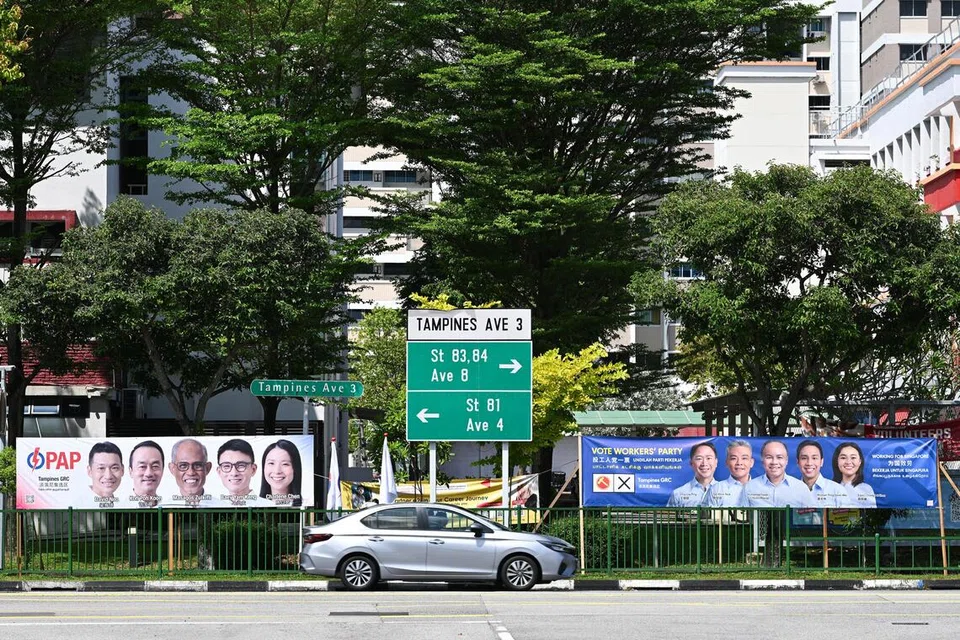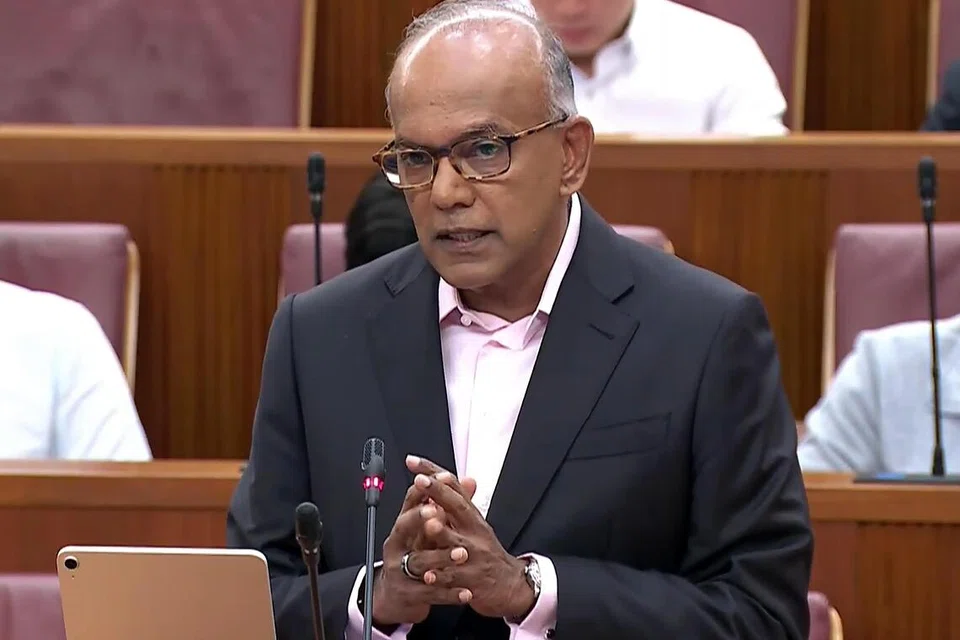Resist the destructive temptation to use race and religion in election campaigns for easy political wins, and steer clear of identity politics, Coordinating Minister for National Security K. Shanmugam urged Parliament on Oct 14.
In an hour-long speech that referred to “troubling incidents” during the May general election, he set out the fundamental principles underpinning Singapore’s approach to race and religion, as well as how politicians here should respond to future attempts to provoke such issues.
While people are free to practise their faiths, the Government’s position is that public political debate must be conducted and decided on a secular basis. This approach is central to Singapore’s existence as an independent nation, said Mr Shanmugam, who is also Home Affairs Minister.
In particular, he highlighted the opposition Workers’ Party’s reaction to remarks made during the hustings by self-styled religious teacher Noor Deros and politicians from Malaysia’s Islamist party, Parti Islam Se-Malaysia (PAS), saying that the WP could have acted more quickly and been less ambiguous about its stance.
Political parties should “immediately, clearly and unequivocally” reject any such attempts to interfere in Singapore’s political process in future, the minister said.
Mr Shanmugam also pointed to how identity politics has split countries around the world, including the US, cautioning the House that such division is hard to contain and impossible to reverse.
Ultimately, it will lead to political parties courting the majority vote and minorities being marginalised, he said in his ministerial statement.
While Singapore looks stable now, it is no more stable than other countries where communal relations have worsened as a result of these pressures, he added.
The minister’s remarks were the latest in a series of statements on identity politics that have been made since the election, when external parties sought to sway voters through online appeals.
Mr Shanmugam said he was bringing the matter up again to remind Singaporeans of the framework and fundamentals that are crucial to the country’s success.
“It is too serious a matter – existential to Singapore – for us to simply let it slide,” he said. “And so I decided to make this statement at the earliest opportunity after the opening of Parliament.”
‘Troubling incidents’ during GE2025
In his speech, Mr Shanmugam referenced remarks made during the election campaign by Mr Noor, as well as politicians from PAS.
Mr Noor had posted online about meeting WP representatives, including its Malay candidates, and said the party was the only one taking his demands seriously.
Both Mr Noor and PAS politicians called on voters to throw their weight behind the WP’s Faisal Manap, who led a five-member team contesting Tampines GRC. The WP team was up against a PAP team led by then Minister-in-charge of Muslim Affairs Masagos Zulkifli.
“That the Malay/Muslim vote in particular was being targeted was obvious,” Mr Shanmugam said.
He noted that the PAS politicians saw an opening and urged Singaporeans to vote along racial and religious lines.
“Does anyone, whether in here or outside, seriously believe that PAS is supporting the WP’s Malay/Muslim candidates in Singapore because PAS cares for Singaporeans?”
The WP responded to this issue on April 26, the fourth day of the hustings. Mr Shanmugam said the party should have done so immediately rather than wait several days, and been more definitive about its stance.
Initially, the WP had not clearly rejected foreign influence or the foreign endorsement of its candidates, he noted.
Mr Shanmugam also flagged statements from Singapore Democratic Party candidate Damanhuri Abas, who contested Sembawang GRC as part of a five-member team.
He said Mr Damanhuri had called for Malay voters to vote against the PAP and framed this as an issue of “upholding Malay dignity” – a euphemism, the minister said, for Malay “rights”.
This is a slippery and dangerous path that will invite a strong reaction from other races in future elections, the minister cautioned.
Politicians play a role in setting the right tone for society, Mr Shanmugam said, and should encourage constructive discussion and find solutions to problems faced by different ethnic groups.
He added: “It is possible for politicians to say they subscribe to our multiracial and multi-religious values, but still use veiled rhetoric to work up racial and religious sentiment.”
Singapore’s active role in managing race and religion
Mr Shanmugam recounted how Singapore’s founding leaders took systematic steps to build a multiracial country in the face of “tremendous opposition”, especially from organisations representing the majority Chinese population.
At the time, many newly independent countries officially adopted the language and culture of the majority ethnic group. Had Singapore done so, Mandarin would have been its only official language, the minister said.
Barisan Sosialis, the main opposition party then, had taken an active position on the matter, stoking tensions within the Chinese community. The PAP’s multiracial approach – which Mr Shanmugam described as “the more difficult, more idealistic course” – was therefore not politically expedient.
“We set out these principles as our ideals, and we swam strongly against the tide, the tide of ethnic identity as the organising principle of society,” he said.
Mr Shanmugam also noted that tensions can escalate quickly. For instance, the 1964 race riots took place just 10 months after Chinese-Malay relations began to spiral downwards following political tensions with Malaysia.
In the present day, culture wars in the US are fuelled by identity-based political campaigns and the blurring of lines between religion and politics, Mr Shanmugam said.
“Every grievance, every disagreement is framed as an ideological battle. It becomes an all-out war, with no room for compromise,” he said.
If such tactics are used in Singapore, the largest and best-organised groups will get their way and conflict is inevitable, he added.
On Tampines GRC, Mr Shanmugam said if the Malay/Muslim community had responded to appeals based on identity politics, other ethnic groups would have noticed.
“Our sense is that something like that may have started to happen in Tampines,” he noted. “Many Chinese voters in Tampines seem to have observed the communal nature of the appeals to the Malay voters, and they seem to have chosen to take a different direction, during this GE.”

He said that today, Singapore has a strong legal framework to protect communal harmony and the Government actively promotes mixing among the different ethnic groups through various policies and platforms.
“I am not suggesting that racial and religious harmony is perfect in Singapore,” he added. “But as a system, we have sought to contain and overcome the natural human impulses by overlaying them with a broader sense of national identity.”
At present, the situation in Singapore is broadly stable, in part because the ruling PAP has eschewed identity politics and borne the political cost of fighting against attempts to stir up such sentiments, Mr Shanmugam said.
“It would have been easier to leave all of this unsaid,” he added of his speech. “But this statement has to be made in the country’s interests.”
He also warned that this stability is not to be taken for granted. If future political leaders on all sides see identity politics gain traction here, they will be pressured and tempted to take part themselves, he said.
“You know what will happen? Then it is a one-way street to ruin,” he added.
The Government’s position is not that politics is incompatible with race and religion, Mr Shanmugam said.
“All religions provide guidance on important aspects of life. So inevitably, there will be areas where faith and public issues overlap,” he noted.
He said that today, Singapore has a strong legal framework to protect communal harmony and the Government actively promotes mixing among the different ethnic groups through various policies and platforms.
“I am not suggesting that racial and religious harmony is perfect in Singapore,” he added. “But as a system, we have sought to contain and overcome the natural human impulses by overlaying them with a broader sense of national identity.”
At present, the situation in Singapore is broadly stable, in part because the ruling PAP has eschewed identity politics and borne the political cost of fighting against attempts to stir up such sentiments, Mr Shanmugam said.
“It would have been easier to leave all of this unsaid,” he added of his speech. “But this statement has to be made in the country’s interests.”
He also warned that this stability is not to be taken for granted. If future political leaders on all sides see identity politics gain traction here, they will be pressured and tempted to take part themselves, he said.
“You know what will happen? Then it is a one-way street to ruin,” he added.
The Government’s position is not that politics is incompatible with race and religion, Mr Shanmugam said.
“All religions provide guidance on important aspects of life. So inevitably, there will be areas where faith and public issues overlap,” he noted.
But even as people are free to practise their faiths and express views on political issues that are motivated by their religious convictions, they must do so in a way that is respectful of other religions, he said.
“All political parties need to be absolutely clear: Religion must not be misused for political purposes. It must never be brought into election campaigns,” Mr Shanmugam said. “Without this shared restraint, destructive competition for power and influence between the different groups can only follow.”
The same logic applies to race, he added.
“We need to think of our Singaporean identity as fundamental, and we each have to give up something to strengthen the shared Singaporean identity,” the minister said.
Mr Shanmugam rounded up his speech with an appeal to MPs on both sides of the aisle.
“We may debate and disagree on many things, but I hope that we can all commit to handle issues of race and religion in a responsible and sensible manner, and to uphold the integrity of Singapore’s secular politics,” he said.
The Straits Times

